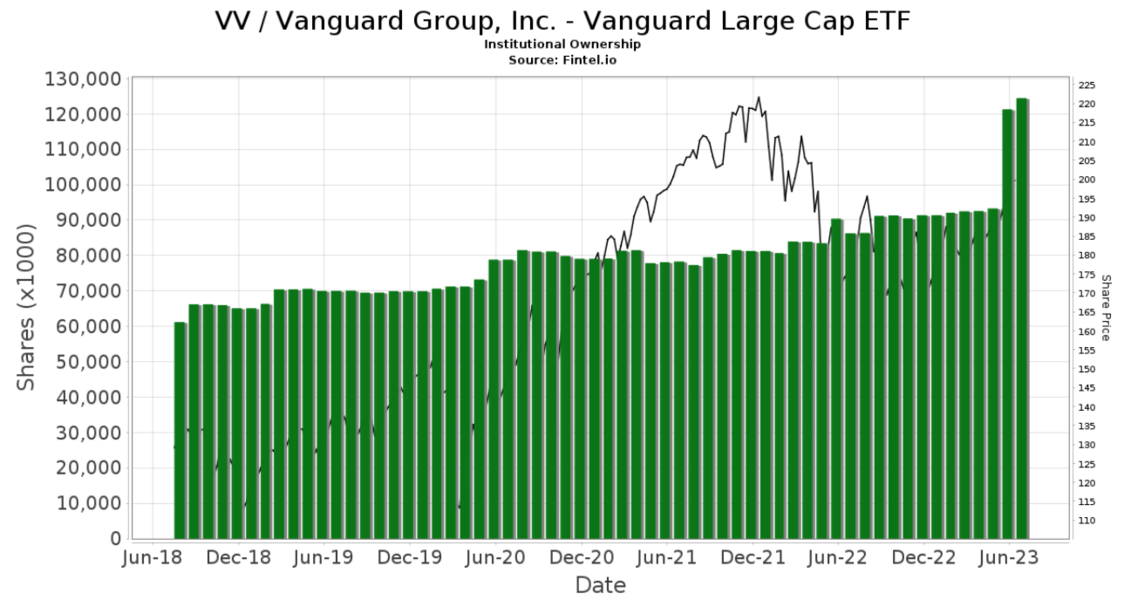Company Overview
Operations
Market[1]
The Vanguard Group stands as a prominent global investment management firm renowned for its distinct focus on cost-effective index funds and exchange-traded funds (ETFs). Operating within the realm of financial services, Vanguard extends an array of investment solutions catering to individual investors, institutional clients, and financial advisors. Vanguard garners particular acclaim for its dedication to passive investing, which manifests through its expansive selection of index funds and ETFs meticulously mirroring diverse market indices like the S&P 500. Unlike active management strategies, these passive investment vehicles strive to emulate the performance of specific market benchmarks, embracing the benefits of a replicative approach rather than seeking to outperform them. This strategy has gained favor due to its typically reduced fees and potential tax efficiency compared to actively managed counterparts.
Vanguard has historically established a robust market presence through its resolute commitment to delivering economical investment avenues and its unwavering focus on client interests. By minimizing costs and sharing the advantages of economies of scale with its investors, Vanguard has amassed a substantial share of assets from both retail and institutional stakeholders.
Vanguard's reputation as a distinguished investment management entity revolves around its specialization in economical, passive investment solutions, encompassing index funds and ETFs. As a seasoned industry frontrunner, Vanguard encounters formidable competition from other major investment management enterprises. Among its key rivals are BlackRock, Fidelity Investments, State Street Global Advisors, T. Rowe Price, Charles Schwab, and Invesco. These contenders vie with Vanguard by furnishing akin investment products and services, striving to maintain their market edge through diversified portfolios, competitive fees, and exceptional customer support.
Financials

Historic
Valuation: [3]
As of 2022, Vanguard has more than $8 trillion in assets under management (AUM), second only to BlackRock, Inc ($9.5 trillion AUM). It has 204 U.S. funds and 206 international funds as of 2022. It also has one of the largest bond funds in the world, the Vanguard Total Bond Market Index Fund (VBTLX).
Risks
The Vanguard Group, as a prominent investment management company, faces various types of risks inherent to its operations and the financial industry at large. These risks can impact Vanguard's financial performance, reputation, and ability to serve its clients effectively. Here's an in-depth exploration of the different kinds of risks Vanguard encounters:
Market Risk: Market risk, also known as systematic risk or non-diversifiable risk, refers to the potential losses that can occur due to fluctuations in financial markets. As Vanguard primarily deals with investment products like mutual funds, index funds, and ETFs that are tied to market performance, the company is exposed to market volatility. Sudden shifts in market conditions, economic downturns, geopolitical events, and interest rate changes can lead to decreases in the value of the assets Vanguard manages, affecting its investment portfolios and the returns for its clients.
Investment Risk: Vanguard's success heavily relies on the performance of its investment products. Poor investment decisions or misjudgment of market trends can lead to losses. Despite its emphasis on passive investing and tracking market indices, there's still a risk that the chosen benchmarks may underperform or become subject to unforeseen events.
Regulatory and Compliance Risk: The financial industry is heavily regulated, and non-compliance with these regulations can lead to legal actions, fines, and damage to reputation. Vanguard must navigate a complex web of laws, regulations, and reporting requirements that can change over time. Regulatory changes can impact the way Vanguard operates, the products it offers, and its relationships with clients.
Operational Risk: Operational risk pertains to the potential losses arising from internal processes, systems, human error, or external events. For Vanguard, operational risk could involve technology failures, data breaches, errors in trading or reporting, or disruptions to its operations due to unforeseen events like natural disasters. Such incidents can lead to financial losses and reputational damage.
Liquidity Risk: Vanguard offers investment products that provide liquidity to its clients, allowing them to buy or sell shares easily. However, Vanguard needs to manage the liquidity of its funds to meet redemption requests without negatively affecting the remaining investors. In times of market stress or sudden large-scale withdrawals, Vanguard could face challenges in maintaining liquidity, potentially leading to forced asset sales or the suspension of fund redemptions.
Reputation Risk: Reputation risk arises from negative public perception, often stemming from factors like poor investment performance, regulatory issues, client dissatisfaction, or unethical behavior. As a trusted steward of clients' money, Vanguard's reputation is crucial. Any damage to its reputation could result in a loss of clients and a decline in assets under management.
Competitive Risk: The investment management industry is highly competitive, with numerous firms vying for market share. Vanguard faces competition from established players like BlackRock, Fidelity, and others, as well as newer entrants and disruptive technologies. Staying ahead of competitors requires ongoing innovation, maintaining cost competitiveness, and adapting to changing client preferences.
Currency Risk: Vanguard operates globally, which exposes it to currency risk. Fluctuations in exchange rates can impact the value of investments denominated in foreign currencies. Currency risk can affect the returns of international investments and impact Vanguard's ability to provide consistent returns to clients.
Interest Rate Risk: Changes in interest rates can impact the value of fixed-income investments held by Vanguard's funds. If interest rates rise, the value of existing fixed-income securities may decrease, potentially leading to losses for clients invested in those funds.
Client Behavior Risk: Vanguard's clients' actions, such as sudden mass redemptions during market downturns, can impact the stability and performance of its funds. If clients panic and withdraw en masse, Vanguard might need to sell assets quickly, potentially realizing losses or compromising the interests of remaining clients.
To manage these risks, Vanguard employs a combination of careful investment strategies, diversification, risk assessment, regulatory compliance, and client communication. The company's commitment to transparency, client education, and its long-term perspective plays a pivotal role in mitigating these various risks and ensuring its continued success in the investment management landscape.